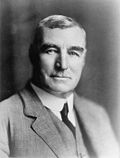Members of Parliament who have served for at least 30 years
Key
| Liberal | Reform | Labour |
| National | NZ First | United Future |
†: Died in office
| Name | Portrait | First elected | Left Parliament | Highest office held | Period of service | References | |
|---|---|---|---|---|---|---|---|
| Rex Mason |  | 15 April 1926 | 25 October 1966 [nb 1] | Cabinet Minister | 40 years, 193 days | [2] | |
| Sir Keith Holyoake |  | 1 December 1932 | 10 March 1977 | Prime Minister | 39 years, 94 days | [3] | |
| Sir Maurice O'Rorke |  | 18 January 1861 | 5 November 1902 [nb 2] | Speaker of the House | 38 years, 235 days | ||
| Sir Walter Nash |  | 18 December 1929 | 4 June 1968† | Prime Minister | 38 years, 169 days | [4] | |
| Jonathan Hunt |  | 26 November 1966 | 30 March 2005 | Speaker of the House | 38 years, 124 days | [5] | |
| Sir Āpirana Ngata |  | 20 December 1905 | 30 August 1943 [nb 3] | Cabinet Minister | 37 years, 253 days | [6] | |
| Winston Peters |  | 24 May 1979 | present | Deputy Prime Minister | 37 years, 223 days | ||
| Sir Joseph Ward |  | 26 September 1887 | 8 July 1930† | Prime Minister | 36 years, 306 days | ||
| Trevor Mallard |  | 14 July 1984 | 20 October 2022 | Speaker of the House | 35 years, 87 days | [7] | |
| Sir William Steward |  | 3 February 1871 | 20 November 1911 [nb 4] | Speaker of the House | 34 years, 287 days | [8] [9] | |
| George Forbes |  | 17 November 1908 | 30 August 1943 [nb 5] | Prime Minister | 34 years, 286 days | ||
| Sir Eruera Tirikātene |  | 3 August 1932 | 11 January 1967† | Cabinet Minister | 34 years, 161 days | ||
| Warren Freer |  | 24 September 1947 | 29 October 1981 [nb 6] | Cabinet Minister | 34 years, 35 days | [10] | |
| Clyde Carr |  | 14 November 1928 | 31 May 1962 | Chairman of Committees | 33 years, 198 days | [11] | |
| Peter Dunne |  | 14 July 1984 | 23 September 2017 | Cabinet Minister | 33 years, 71 days | [12] | |
| William Hughes Field |  | 6 January 1900 | 1 November 1935 | MP | 32 years, 278 days | [13] | |
| Sir Arnold Nordmeyer |  | 27 November 1935 | 28 October 1969 | Leader of the Opposition | 32 years, 230 days | [14] | |
| Sir James Carroll |  | 7 September 1887 | 27 November 1919 [nb 7] | Cabinet Minister | 32 years, 81 days | [15] | |
| Peter Fraser |  | 3 October 1918 | 12 December 1950† | Prime Minister | 32 years, 70 days | [16] | |
| Phil Goff |  | 28 November 1981 | 12 October 2016 | Leader of the Opposition | 31 years, 309 days | ||
| Robert McKeen |  | 7 December 1922 | 5 October 1954 [nb 8] | Speaker of the House | 31 years, 302 days | [17] | |
| Bill Parry |  | 17 December 1919 | 27 July 1951 [nb 9] | Cabinet Minister | 31 years, 222 days | [18] | |
| Damien O'Connor |  | 6 November 1993 | present | Cabinet Minister | 31 years, 164 days | ||
| Gordon Coates |  | 19 December 1911 | 27 May 1943† | Prime Minister | 31 years, 159 days | ||
| Sir Robert Muldoon |  | 26 November 1960 | 17 December 1991 | Prime Minister | 31 years, 35 days | [19] | |
| William Massey |  | 9 April 1894 | 10 May 1925† | Prime Minister | 31 years, 31 days | [20] | |
| Sir James Allen |  | 26 September 1887 | 22 March 1920 | Cabinet Minister | 30 years, 330 days | [21] | |
| Nick Smith |  | 27 October 1990 | 10 June 2021 | Cabinet Minister | 30 years, 226 days | ||
| Bob Tizard |  | 30 November 1957 | 27 October 1990 | Deputy Prime Minister | 30 years, 196 days | ||
| Sir Robert Macfarlane |  | 3 June 1939 | 28 October 1969 [nb 10] | Speaker of the House | 30 years, 147 days | ||
| Sir Thomas Wilford |  | 4 December 1896 | 18 November 1929 | Leader of the Opposition | 30 years, 109 days | [22] [23] | |
| Annette King |  | 14 July 1984 | 23 September 2017 | Cabinet Minister | 30 years, 63 days | ||
| Murray McCully |  | 15 August 1987 | 23 September 2017 | Cabinet Minister | 30 years, 39 days | ||
| Maurice Williamson |  | 15 August 1987 | 23 September 2017 | Cabinet Minister | 30 years, 39 days | ||
| Thomas Young Duncan |  | 9 December 1881 | 19 December 1911 | Cabinet Minister | 30 years, 10 days |
Table footnotes: [24]
- ↑ date of dissolution of the 34th Parliament
- ↑ date of dissolution of the 14th Parliament
- ↑ date of dissolution of the 26th Parliament
- ↑ date of dissolution of the 17th Parliament
- ↑ date of dissolution of the 26th Parliament
- ↑ date of dissolution of the 39th Parliament
- ↑ date of dissolution of the 19th Parliament
- ↑ date of dissolution of the 30th Parliament
- ↑ date of dissolution of the 29th Parliament
- ↑ date of dissolution of the 35th Parliament

